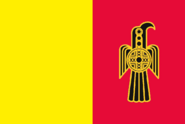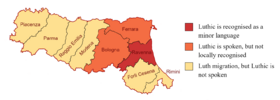Template:Front/featured
| Luthic | |
|---|---|
| Lûthica | |
 Flag of the Luthic-speaking Ravenna | |
| Pronunciation | [ˈlu.ti.xɐ] |
| Created by | Lëtzelúcia |
| Date | 2023 |
| Setting | Alternative history Italy |
| Native to | Ravenna; Ferrara and Bologna |
| Ethnicity | Luths |
| Native speakers | 149,500 (2020) |
Indo-European
| |
Early forms | Proto-Luthic
|
Standard form | Standard Ravennese Luthic (Lûthica)
|
Dialects |
|
| Official status | |
Recognised minority language in | |
| Regulated by | Council for the Luthic Language |
| Language codes | |
| CLCR | qlu |
| BRCL | luth |
 The areas where Luthic (red and orange) is spoken. | |
Luthic (/ˈluːθ.ɪk/ LOOTH-ik; endonym: Lûthica [ˈlu.ti.xɐ]) is an Italic language that is spoken by the Luths, with strong East Germanic influence. Unlike other Romance languages, such as Portuguese, Spanish, Catalan, Occitan and French, Luthic has a large inherited vocabulary from East Germanic, instead of only proper names that survived in historical accounts, and loanwords. About 250,000 people speak Luthic worldwide.
Luthic is the result of a prolonged contact among members of both regions after the Gothic raids towards the Roman Empire began, together with the later West Germanic merchants’ travels to and from the Western Roman Empire. These connections, the interactions between the Papal States and the conquest by the Germanic dynasties of the Roman Empire slowly formed a creole as a lingua franca for mutual communication.
As a standard form of the Gotho-Romance language, Luthic has similarities with other Italo-Dalmatian languages, Western Romance languages and Sardinian. The status of Luthic as the regional language of Ravenna and the existence there of a regulatory body have removed Luthic, at least in part, from the domain of Standard Italian, its traditional Dachsprache. It is also related to the Florentine dialect spoken by the Italians in the Italian city of Florence and its immediate surroundings.
Luthic is an inflected fusional language, with four cases for nouns, pronouns, and adjectives (nominative, accusative, genitive, dative); three genders (masculine, feminine, neuter); and two numbers (singular, plural).